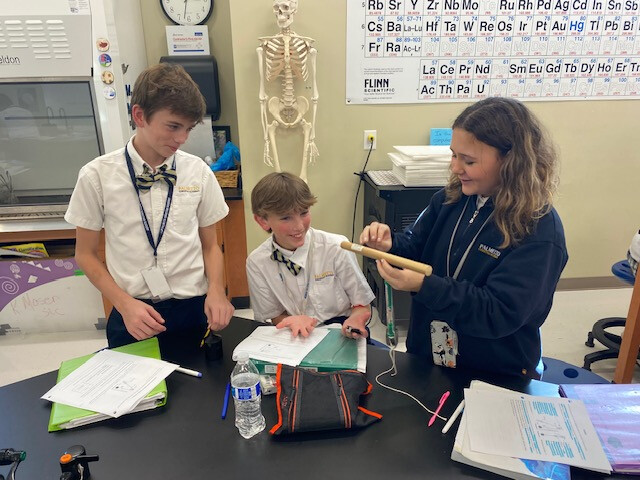National Honor Society Inducts New Members

Congratulations to our 2023-2024 National Honor Society Inductees! Thirty-six new members were inducted prior to the Thanksgiving break into this premier organization which recognizes outstanding high school students across the nation. The minimum criteria for the inductees are that they must be in tenth grade, a student of good character, in their second year at PCA, having either completed one honors course or are currently taking an honors course, and have a 4.2 GPA.
NHS Co-Advisor, Marcia Siebert, stated, "The five pillars of NHS are: leadership, scholarship, character, citizenship and service. This will be the largest number of new inductees, a total of 36, that PCA has ever inducted at one time, bringing our total club membership to 61 students. That means 61 students who are excelling in each of those very important aspects of character. This is huge, both for our school and our community to have so many young people that are excelling in not just academics but these other very important leadership ways as well."
The induction ceremony opened with a Welcome from NHS Co-Advisor, Rachel Tisdale, followed by the pledge to the Bible and to the American Flag, and the National Anthem sung by the High School Choir. Mrs. Siebert made some introductory remarks, and NHS officers: President Autumn Benton, Vice President Joshua Matthews, Secretary Blaise Sorensen, Treasurer Ava Bowen, and Chaplain Hannah Delaney continued by lighting a candle for each of the 5 pillars, speaking on each of the service traits.
Each of the inductees were invited to the stage to receive their certificate of recognition. Upper School Principal, Sean Keiper, closed the ceremony with a prayer. Students then posed for pictures with their families and attended a small reception in the Welcome Center for parents and new inductees.
Congratulations to the newest inductees: Micah Batzig, Alden Baugh, Lawton Blevins, Alyssa Carper, Lily Calderon, Avery Clark, Ashley DeWeese, Harper Geiger, George Greene, Chloe Guyan, Sadie Holdridge, Josie Hurley, Reed Jones, Jenna Leon, Benjamin Marlow, Benjamin McCartney, Amelia Morris, Davis Murphy, Lucia Noce, Grace Anna Parker, Keane Parker, William Perkins, Sophia Ralph, Lydia Renau, Charlotte Roberts, Anna Claire Romine, Evan Seay, Isabella Sese, Saylor Sorensen, Sam Smith, Kyler Stille, Addison Surratt, Joseph Terry, Eliana Thomas, Leah Vesper, and Katherine Grace Winther.

